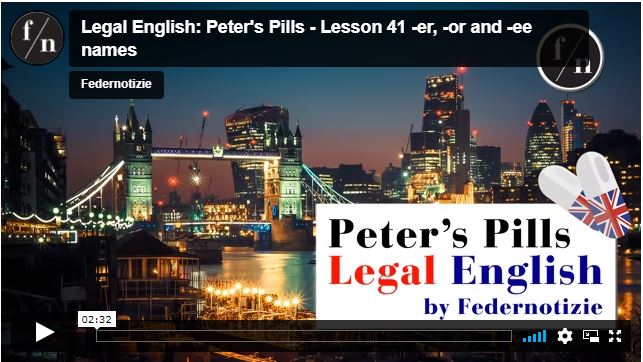Nuovo appuntamento con “Peter’s Pills“, la rubrica online di Legal English by Federnotizie (la rivista online di Federnotai), in collaborazione con Confprofessioni e Beprof. La 41esima video-lezione “-er, -or and -ee names” è disponibile sul sito sui canali social e sul sito Federnotizie di Confprofessioni e sull’app Beprof, scaricabile da App Store e Google Play.
LESSON N. 41: CLICCA QUI PER IL VIDEO
Hello!
Names with reciprocal opposite relationships are often indicated by -er/-or and -ee endings in Legal English.
Generally the party who “does” or “gives” ends in -er/-or, while the party who “receives” ends in -ee.
So, for example, an Employer is someone who gives employment to another person known as an Employee. Lets look at some more common examples like this:
Assignor is a party who assigns or transfers something to another party. Assignee is the party to whom something is assigned.
Donor is a party who donates something to another party.
Donee is the party to whom something is donated.
Interviewer is a person who is interviewing someone.
Interviewee is a person who is being interviewed by the interviewer.
Lessor is a party who grants a lease over a property. This person is therefore the owner of the property or the landlord.
Lessee is the party to whom a lease over a property is granted. This person is therefore the tenant.
(Please be careful with Mortgagor and Mortgagee)
Mortgagor (or mortgager) is the property owner who gives property as security for money.
Mortgagee is the bank which accepts the property as security for money which it loans.
Offeror is a party who makes a contractual offer to another party. Offeree is the party to whom a contractual offer is made.
Payer is a party who makes a payment to another party.
Payee is the party to whom payment is made.
Promisor is a party who makes a promise to another party.
Promisee is the party to whom a promise is made.
Transferor is a party who transfers something to another party.
Transferee is the party to whom something is transferred Please notice this grammar rule: when there is a preposition before “who” we must use “whom” in English. So we say “a party TO whom” and NOT “a party TO who” Thank you very much and see you next time for more Peter’s Pills to improve your Legal English!


